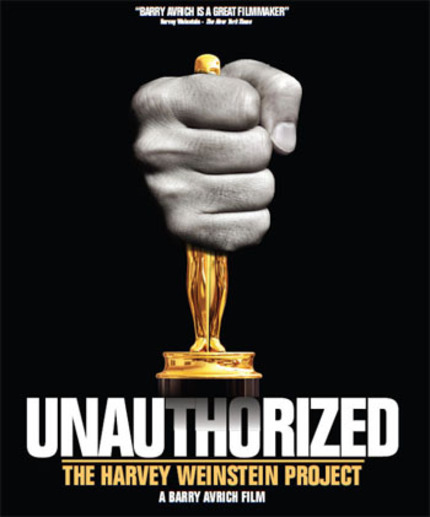Review: UNAUTHORIZED - THE HARVEY WEINSTEIN PROJECT

Barry Avrich's new documentary endeavors to give a broad overview of the brothers' distribution company, named after truncated marrying of the parents names Miriam and Max. Miramax eventually morphed into a mini-studio fronting expensive productions from the likes of Martin Scorsese and Anthony Minghella under the Buena Vista (that would be Disney) umbrella. The focus is the larger than life producer/screamer/bully Harvey Weinstein, often dubbed the 'Last of the Hollywood Moguls' which is kind of amusing considering his company operated out of New York City, but hey, lets print the legend here folks. Avrich outlines the early start by the Brothers W as Buffalo concert promoters selling big-draw bands like The Grateful Dead and Stephen Stills before cutting their teeth on concert films such as The Secret Policeman's Ball which already put Harvey on the road towards his pejorative nick-name, Harvey Scissorhands, by editing both it and its sequel together for its US release. That was 1982. Avrich then goes on to hit the major milestones throughout the 80s and 90s and aughts (mostly the 90s though) due to marketing wizardry (The Crying Game, Shakespeare in Love, The English Patient) or lightning in a bottle (Pulp Fiction, Clerks, Sling Blade, Fahrenheit 911). There is some focus on Bob and his Dimension Pictures genre-label (which payed a lot of the bills with the Scream and Scary Movie franchises (expert milking of both the original, which is coming out with a 4th sequel, and the parody for maximum box office action) for Harvey's follies of which there are too many to name!) as well as the tempestuous relationship with Disney, particularly on controversial releases such as Kids, Priest and (this now seems quaint) Dogma. This is mostly done with talking heads, but unlike Harvey's knack for assembling a who's who of A-list talent to work for nothing, Avrich is stuck with C-List names to share their 'Harvey stories.' And everyone has a Harvey story, particularly Peter Biskind who gets a lot of screen time re-iterating points from his much more salacious and comprehensive (and lets face it entertaining) book, Down And Dirty Pictures, which covers a lot of the same ground here. If you 've read that, you will not learn much from Unauthorized. The key question is whether or not results trump methods. Harvey Weinstein may have had a scorched earth policy to his staff and his competitors, but if imitation is the highest form of flattery, he caused all of the studios to have their own boutique indie label and brought a lot of middle-brow foreign films to people who feared the subtitle. Unauthorized touches on this here and there, but never fully engages it, rather indulging itself in Harvey the wikipedia entry vs. Harvey the metaphor.
Back in the aughties I used to write a irregular column on ScreenAnarchy called 'Weinstein Watch,' which detailed the various projects acquired by Miramax, particularly Asian films, and then never released. A couple of those casualties were Tears of the Black Tiger and Zu Warriors. Zhang Yimou's Hero would have been the biggest bit of craziness if Quentin Tarantino hadn't pretty much bullied it out the Miramax door to a release that made the company a fair bit of profit. Alas though, Avrich is very much focused on the celebrity and Oscar product, and spares not a single minute of run-time on the angle of cultural misappropriation, which is kind of baffling. All of this is a round-about way of saying casual viewers only will find anything new here, and the delivery passes the time, but is not extraordinary in any way. Certainly a far cry from pushing films like mistaken transsexual love affairs, or pigs on trial for murder onto the unsuspecting masses. Albeit Harvey cut 10 minutes from The Advocate and changed the title from the original, Hour of The Pig, plopped on a misleading cover and cut 10 minutes to get it down from an R Rating, all the tricks of his own M.O. Harvey and Miramax deserve a few more below-the-belt punches in a documentary with the hype-laden title like "UNAUTHORIZED". It'd be only fair.

Do you feel this content is inappropriate or infringes upon your rights? Click here to report it, or see our DMCA policy.






